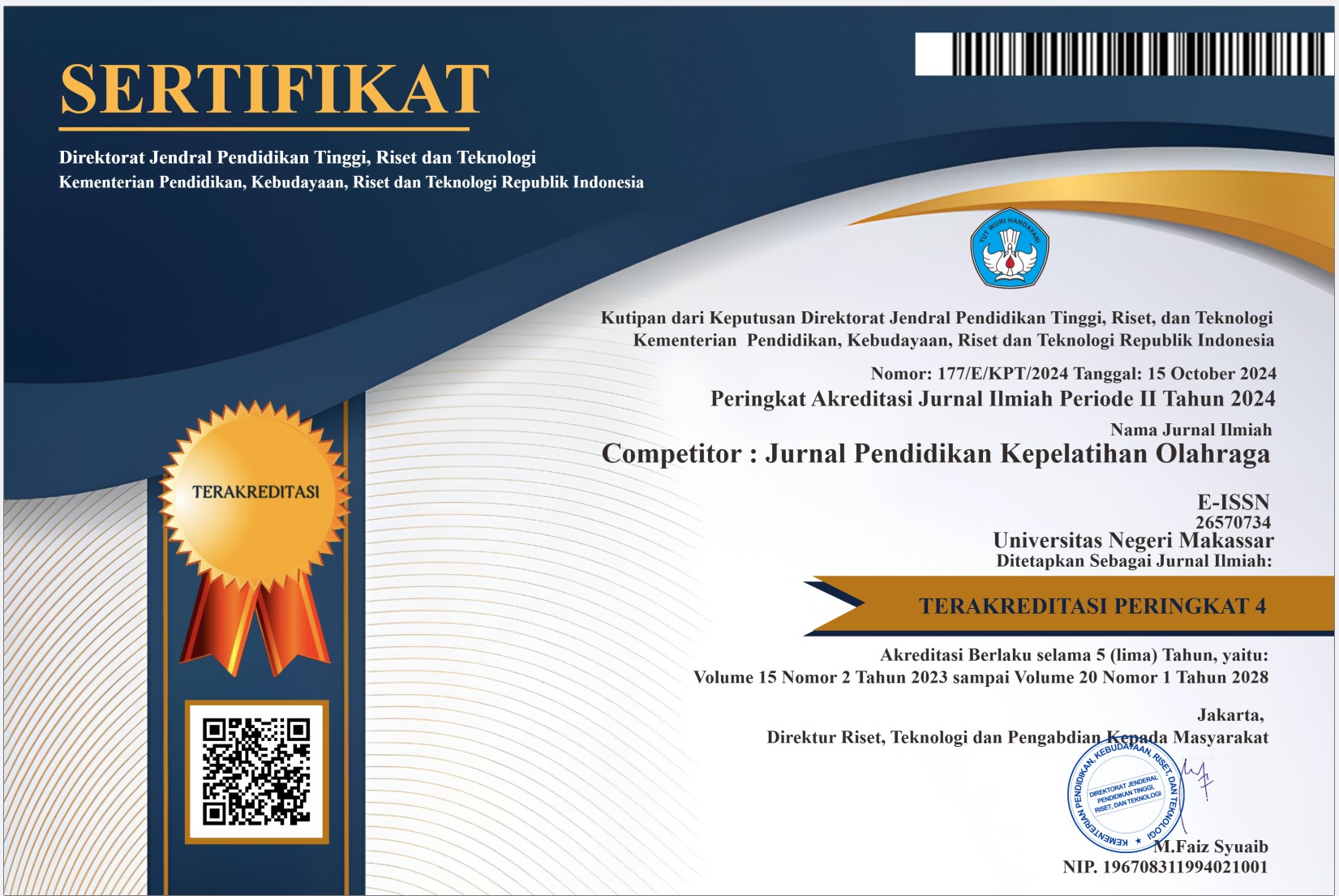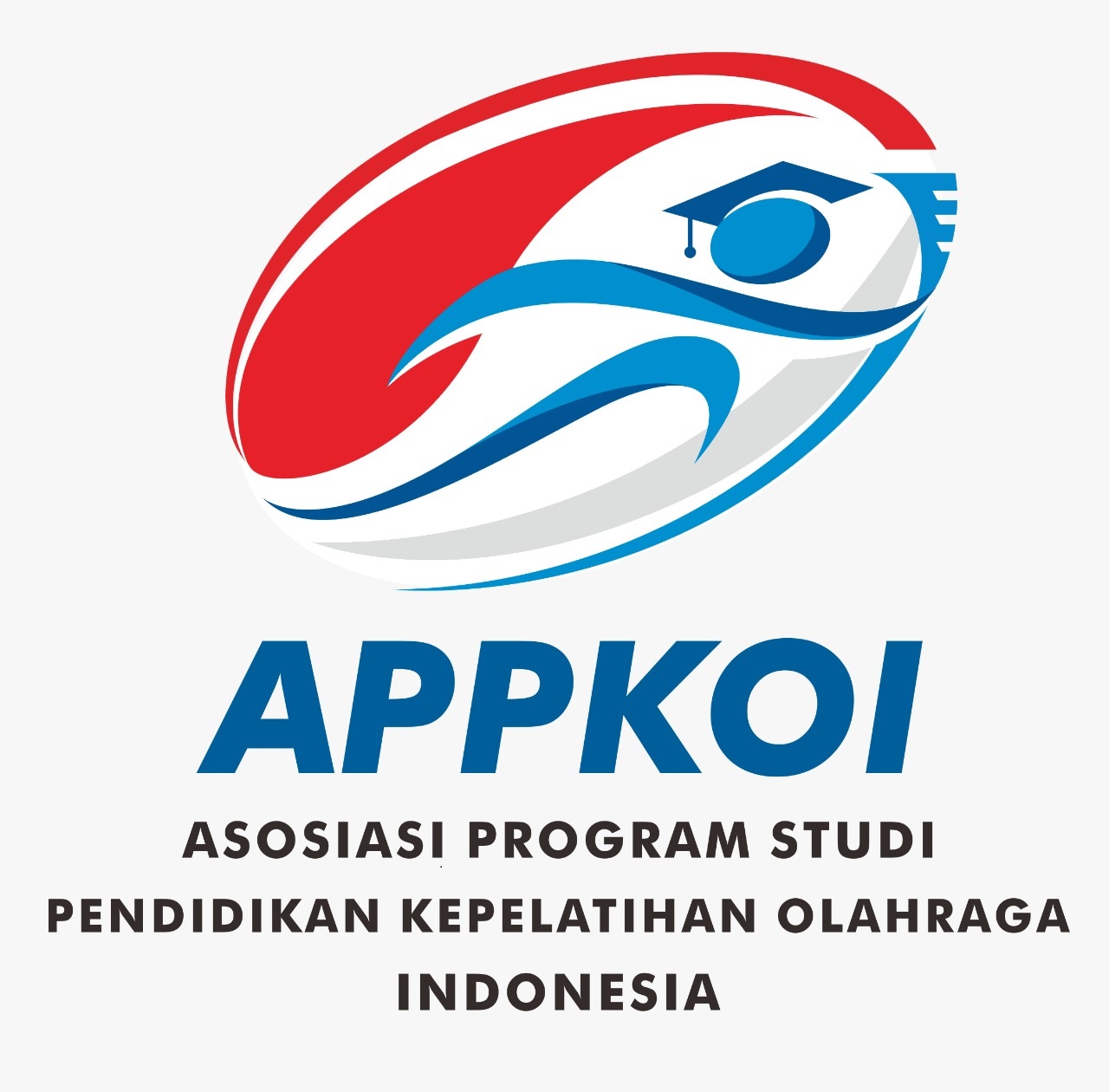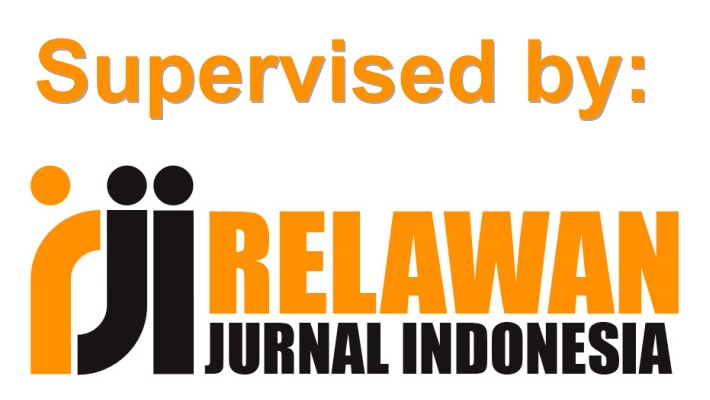The Effect Of Self-Hypnosis Training On Improving The Ability To Concentrate And Emotions Of South Sulawesi Archery Athletes
DOI:
https://doi.org/10.26858/cjpko.v17i2.73446Keywords:
Training: Self-Hypnosis, Concentration, Emotion, Archery.Abstract
This study is an experimental study with a quantitative approach that aims to analyse the effect of self-hypnosis training on improving concentration and emotional management skills in archery athletes in South Sulawesi Province. The method used in this study is a one-group pre-test post-test design experiment, with a total sampling technique, involving 10 athletes as respondents. The research process was carried out for two months, starting from the initial observation stage, implementation of the intervention, to the final evaluation. Self-hypnosis training was given in a structured and systematic manner during the research period, with the aim of improving the mental focus and emotional stability of athletes in facing competition pressure. The research instruments used included a concentration test and a validated emotional control questionnaire. The data obtained were analysed using a t-test (paired sample t-test) to determine significant differences between the pre-test and post-test results. The results of the statistical analysis showed that there was a significant effect of self-hypnosis training on improving athletes' concentration and emotional abilities. The observation t value of 12.0000 is smaller than the t table value of 19.3000, and the significance level of 0.000 is smaller than the value of α = 0.05. This finding indicates that self-hypnosis training can significantly help athletes improve the quality of focus and emotional control during training and matches. It can be concluded that self-hypnosis training is an effective method to be applied in athlete psychological development programs, especially in sports that require high concentration, such as archery.
References
Adam Mappaompo, M., Aprilo, I., Elisano Arfanda, P., & Arga. (2024). Shooting Accuracy Of Sports Coaching Education Students : Goaling Game Practice. Indonesian Journal of Research and Educational Review, 3(3), 204–210. https://doi.org/10.51574/ijrer.v3i3.1995
Arga. (2025). Pengaruh Latihan Leg Raise Terhadap Kekuatan Otot Perut Mahasiswa PKO UPRI. Jurnal Pendidikan Kepelatihan Olahraga (PEJUANG), 1(1), 18–23.
Barker, J. B., & Jones, M. V. (2008).
The effects of hypnosis on self-efficacy, affect, and soccer performance: A case study. Journal of Clinical Sport Psychology, 2(2), 127–147. https://doi.org/10.1123/jcsp.2.2.127
Eason, A. D., & Parris, B. A. (2019). Clinical applications of self-hypnosis: A systematic review and meta-analysis of randomised controlled trials. Psychology of Consciousness: Theory, Research, and Practice, 6(3), 262.
Hammond, D. C. (2010). Hypnosis in the treatment of anxiety- and stress-related disorders. Expert Review of Neurotherapeutics, 10(2), 263–273. https://doi.org/10.1586/ern.09.140
Hashim, H. A., & Hanafi, H. (2016). The effects of progressive muscle relaxation and autogenic relaxation on young soccer players' mood states. Asian Journal of Sports Medicine, 7(2), e31254. https://doi.org/10.5812/asjsm.31254
Hawkins, J. (2019). The Science of Hypnosis: A Comprehensive Guide to the Psychology of Hypnosis. New York: Academic Press.
Jansson, L., & Peterson, K. (2018). Long-term effects of psychological interventions on athletic performance: A meta-analysis. Sport Psychology Review, 24(1), 45-63. https://doi.org/10.1080/21520704.2018.1496482
Kogoya, K., Guntoro, T. S., & Putra, M. F. P. (2022). Sports event image, satisfaction, motivation, stadium atmosphere, environment, and perception: A study on the biggest multi-sport event in Indonesia during the pandemic. Social Sciences, 11(6), 241.
Kumar, V. K., Bharti, P., & Sharma, M. (2020). Cost-effectiveness of mental training techniques for elite athletes: A comparative analysis. International Journal of Sport Psychology, 51(4), 323-341. https://doi.org/10.7352/IJSP.2020.51.323
Musa, R. M., Taha, Z., Majeed, A. P. A., & Abdullah, M. R. (2018). Machine learning in sports: identifying potential archers. Springer.
Pates, J., & Maynard, I. (2000). Effects of hypnosis on flow states and golf performance. Perceptual and Motor Skills, 91(3), 1057-1075. https://doi.org/10.2466/pms.2000.91.3.1057
Pates, J., Oliver, J., & Maynard, I. (2001). Effects of Hypnosis on Flow States and Shooting Performance in Elite National Archers. Journal of Applied Sport Psychology, 13(3), 229–245.
Robazza, C., & Bortoli, L. (2018). Emotion in sport: An IZOF perspective on performance optimisation. Wiley.
Schoenberger, Y., Heller, M., & Heller, A. (2017). The effects of hypnosis on stress and anxiety: A meta-analysis. International Journal of Clinical and Experimental Hypnosis, 65(3), 267-284.
Verawati, I., & Valianto, B. (2020, March). The effects of progressive muscle relaxation on concentration in archery athletes at the UNIMED Club. In 1st Unimed International Conference on Sport Science (UnICoSS 2019) (pp. 70-73). Atlantis Press.
Wang, Y., Zhang, Y., & Liu, Y. (2018). The effects of hypnotherapy on cerebral blood flow and cognitive function in patients with anxiety disorders. Journal of Psychosomatic Research, 112, 1-7.
Wu, T. Y., Nien, J. T., Kuan, G., Wu, C. H., Chang, Y. C., Chen, H. C., & Chang, Y. K. (2021). The effects of mindfulness-based intervention on shooting performance and cognitive functions in archers. Frontiers in Psychology, 12, 661961.
Zhang, Y., & Chen, K. (2018). Neural pathways of hypnotic influence on cognitive and emotional processes: A neuropsychological model. Neuroscience & Biobehavioral Reviews,90,428-439. https://doi.org/10.1016/j.neubiorev.2018.04.021
Downloads
Published
Issue
Section
License
Copyright (c) 2025 Nur Islam, Nukhrawi Nawir, Himad Hakim, Muh. Adnan Hudain, Sahabuddin Sahabuddin (Author)

This work is licensed under a Creative Commons Attribution 4.0 International License.



















